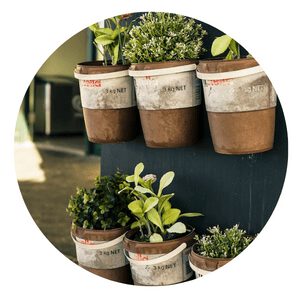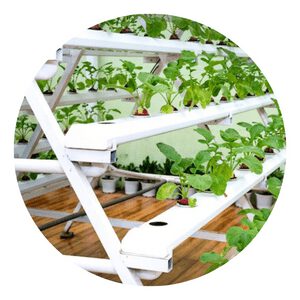The History of Organic Farming
Organic farming has become increasingly popular in recent years, as more and more people are looking for alternatives to conventional agricultural methods.
But organic farming is actually far from new – it has a long and fascinating history that dates all the way back to ancient times.
This article will explore the origins of organic farming, tracing its development through the centuries until its modern revival.

Organic Farming Menu
Organic Farming
Organic farming has been practiced for centuries, but its widespread acceptance is a relatively recent phenomenon.
In the United States and many other countries around the world, organic farming has become an increasingly popular way to grow food without using synthetic fertilizers or pesticides.
Despite having deep roots in traditional agricultural practices, organic farming is no longer just a fringe movement – it’s now a major industry with a large global market.
Organic farming can be traced back hundreds of years to ancient civilizations like Mesopotamia and Egypt, which relied on natural techniques such as crop rotation and animal manure for soil fertility management.
But it wasn’t until the late 19th century that modern-day organic agriculture began to take shape.
At this time, some farmers began experimenting with natural methods to produce healthier foods with fewer inputs from synthetic chemicals.
Ancient Origins
Organic farming is a centuries-old practice that has been used in many cultures from the dawn of time.
It involves producing food without the use of synthetic fertilizers or pesticides, ensuring that it is grown and harvested in an environmentally friendly way.
As modern society seeks to reduce its environmental impact, organic farming has gained increased attention and popularity.
The origins of organic farming can be traced back as far as ancient Mesopotamia, where farmers understood the importance of biodiversity and sustainability.
The ancient Chinese also practiced organic methods, such as composting crops with animal waste to enrich soil fertility.
In Europe during the Middle Ages, there was an emphasis on crop rotation which helped preserve soil nutrient levels while still providing ample harvests for families and communities.
Organic practices continued to evolve over time, eventually leading to the development of modern organic standards in the 1940s.
Organic farming, so vital and true, has roots that go back centuries ago. Traditional journeying through the lands, growing crops without taking hands. The wisdom of years coming full circle, back to a mindful, balanced lifestyle. Earth-friendly processes reign supreme, as a force for health and healing beam.
Chappy The Gardener
Rise of Industrialization
The industrial revolution of the 19th century brought with it a wave of technological innovation.
As machines replaced manual labor in factories, industries began to grow rapidly, leading to an increased demand for energy and raw materials.
The rise of industrialization changed the way people produced food, shifting from traditional agricultural practices to mass production methods.
Organic farming emerged as a response to this shift.
Organic farmers sought to return the focus back on sustainable and holistic approaches to food production that accounted for the health of humans, animals, and the environment more broadly.
Practices such as crop rotation and integrated pest management allowed organic farmers to produce healthy crops without relying on chemical fertilizers or pesticides that could have a negative impact on local ecosystems.
In addition, organic farming offered economic benefits by allowing farmers to cultivate their own crops instead of having to purchase them from outside sources.
Modern Organic Movement
Organic farming has become an increasingly popular agricultural practice over the past 50 years.
Today, the organic movement seeks to promote sustainable agriculture and prioritize environmental health, economic vitality, and social justice.
As part of this movement, farmers use natural ingredients and minimize their environmental impact while producing high-quality food for consumers.
In recent decades, the organic movement has spread rapidly around the world as it gains popularity with both producers and consumers alike.
Consumers are becoming more aware of where their food comes from, and how it is produced—making them more likely to choose organic options when available.
Farmers are increasingly transitioning to organic practices in order to meet consumer demands while also providing a healthier alternative to conventional farming methods that often utilize chemical pesticides or synthetic fertilizers.
Benefits of Organic Farming
Organic farming has been around for centuries, and its benefits are hard to ignore.
It is a type of agriculture that focuses on using natural processes and inputs to produce food without relying on synthetic chemicals or genetically modified organisms (GMOs).
Organic farming practices can reduce environmental impacts, protect biodiversity, improve animal welfare, and most importantly provide healthier food options for consumers.
Organic farmers use natural methods that increase soil health and fertility such as crop rotation, composting and cover crops.
These techniques help build organic matter in the soil which improves drainage and water retention abilities while also reducing erosion.
By avoiding synthetic fertilizers and pesticides organic farmers are able to make sure their crops are free from contaminants which makes them much safer to consume than conventionally grown foods.
Organic farming also helps promote local economies by providing jobs in rural areas where conventional farms may not be available.
Challenges of Organic Farming
Organic farming is a form of agriculture that has been around for thousands of years and continues to be utilized by farmers today.
As the demand for organic produce increases, so too do the challenges associated with organic farming.
From climate change to pest control, organic farmers must navigate a variety of unique difficulties when managing their land.
One of the most significant challenges for organic farmers is finding ways to combat climate change without using synthetic chemicals or pesticides.
Heat waves, droughts, and floods are all becoming more common in many parts of the world due to global warming, leading to decreased crop yields and increased costs for organic farmers.
To combat this issue, some farmers have turned to traditional methods such as crop rotation and soil conservation in order to get the best yields from their land while still adhering to their strict standards.
Future of Organic Farming
Organic farming is an ancient practice that has only recently become popular again.
It is a type of agriculture that relies on natural processes, such as crop rotation and composting, instead of chemical fertilizers and pesticides.
Organic farming can have many benefits for the environment, health and economy.
As organic farming gains more attention and support from consumers, it is important to consider the future of this growing industry.
The demand for organic food products has been steadily increasing in recent years due to consumer awareness about the dangers of conventional agriculture methods.
This trend is likely to continue as people become more conscious about their impact on the planet and their health.
To meet this increased demand for organic products, farmers are transitioning their farms to use sustainable practices like cover cropping and integrated pest management strategies which reduce water usage, conserve soil fertility and increase biodiversity.
In conclusion,organic farming has a long-standing history that dates back to the early 1900s.
It is an environmentally conscious and sustainable method of agricultural production that avoids the use of synthetic fertilizers and pesticides.
The movement has grown significantly over the past few decades due to its many benefits for human health, the environment, and animal welfare.
Organic farmers have been able to bring about more biodiversity, protect natural resources, and produce healthier foods for consumers.
Click To Grow
Helps Us Grow – Share If You Like















